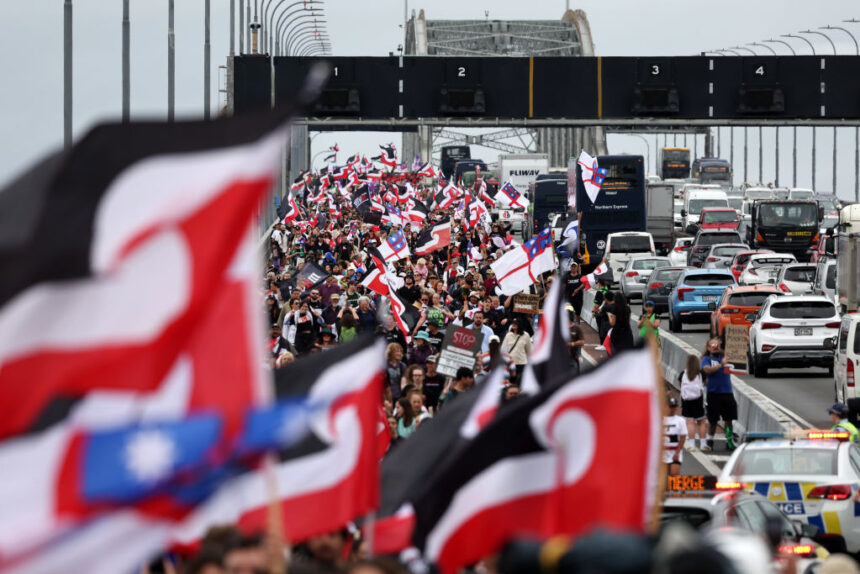Protesters are marching from the top of the North Island and bottom of the South to meet in Wellington, with their numbers increasing and causing disruption.
Protesters are objecting to the introduction of the ACT Party’s Treaty Principles Bill, which aims to codify and, in some cases, override decades of common law on the Treaty of Waitangi. This led to the closure of two northbound lanes on Auckland’s Harbour Bridge this morning.
The Treaty of Waitangi is considered the founding document of New Zealand, signed between the British Crown and most Māori chiefs. There are two versions of the treaty—one in English and one in Māori—and they do not have exactly the same content.
The bill seeks to define the terms of the Treaty based on the meaning at the time of signing, with ACT Leader David Seymour aiming to eliminate unique rights granted to Māori people following more modern interpretations of the treaty.
The NZ Transport Agency and Police decided to close the lanes to separate the increasing number of marchers from rush hour traffic, causing gridlock in both directions for motorists. However, many drivers showed support by honking their horns. The bridge was fully reopened by midday.
Protesters then made their way through downtown Auckland to one of two meeting spots, with thousands of people joining the march. It took several hours for all the marchers to cross.
The first group, led by former Labour MP John Tamihere, president of the Māori Party, went across in groups of 250. Video footage showed the bridge swaying due to the number of footfalls, with Māori Party co-leader Rawiri Waititi among the marchers. Other protesters utilized waka (traditional Māori canoes) and small boats to cross the harbour.
Senior Labour MP Willie Jackson estimated the number of protesters at “10,000, maybe more,” while police put the number at around 5,000.

Te Pati Maori co-leader Rawiri Waititi leads a Hikoi (march) across the Auckland Harbour Bridge on day three of a nine-day journey to Wellington on Nov. 13, 2024.Fiona Goodall/Getty Images
Another group of protesters is heading from the bottom of the South Island, and both groups plan to converge on Parliament to protest the introduction of the Bill.
Activists, academics, and lawyers have criticized the bill for potentially overturning decades of decisions made by the Waitangi Tribunal and the courts, which have interpreted the Treaty for years.
Protesters also express opposition to other government policies that they believe undermine the rights of Māori.
Although the largest party in the coalition government, National, initially opposed the policy during the election campaign, it agreed during coalition negotiations to support the Bill being referred to a Select Committee.
Prime Minister Christopher Luxon has stated that National will not support the bill beyond its first reading, making it unlikely to gain enough support to become law. Last week, the Waitangi Tribunal described the Bill as “the worst, most comprehensive breach of the Treaty in modern times.”
Please rewrite this sentence.
Source link






